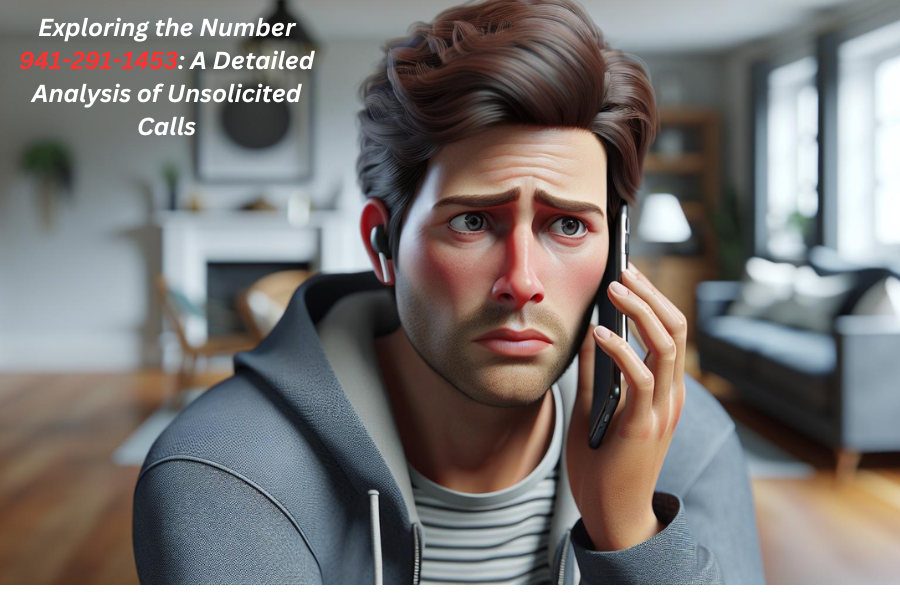
941-291-145
Unraveling the Mystery of 941-291-1453: A Detailed Examination of Unsolicited Calls
Have you ever noticed the number 941-291-1453 appearing on your phone and wondered who might be on the other end? You’re not alone. In today’s world, where robocalls and unsolicited calls are on the rise, many people find themselves perplexed by such numbers. Could it be just another marketing call, or is there a more deceptive agenda behind it?
With the increase in telemarketing scams, phishing attempts, and the overall surge in spam calls, understanding where these unfamiliar numbers come from is becoming more important than ever. This article will explore the number 941-291-1453 and provide valuable information to help you handle these types of calls more effectively. Whether you’re frequently dealing with spam calls or are simply curious, this guide will help you stay informed and protect yourself from potential scams.
The Surge of Robocalls and Unsolicited Numbers
Unsolicited phone calls, especially from unfamiliar numbers, are nothing new, but their frequency has grown significantly. A report from Truecaller, a popular call-blocking app, revealed that Americans received over 50 billion robocalls in one year alone. Numbers like 941-291-1453 often fall into the category of suspicious or unsolicited calls. But what’s driving this increase?
Advancements in technology have made it easier for scammers and marketers to reach a large audience. Automated dialing systems now allow for the simultaneous dialing of hundreds or even thousands of numbers. While legitimate businesses use this technology for marketing and customer service, it is also heavily exploited by scammers who seek to mislead unsuspecting individuals.
You May Also Like: CMW Walls
Understanding the Number 941-291-1453

The number 941-291-1453 is one of many that have raised concerns among phone users and have been flagged as potentially suspicious by reverse phone lookup services and call-reporting platforms. This number is associated with the 941 area code, which primarily serves southwestern Florida, including Sarasota and nearby regions. However, the fact that a number is linked to a certain location does not necessarily mean the call is from that area. Scammers often spoof local numbers to make the call seem more familiar, increasing the chances that people will answer.
Numerous reports from users who have received calls from 941-291-1453 describe varying experiences. Some people report receiving telemarketing calls, while others mention more dubious activities, such as silent calls or pre-recorded messages requesting sensitive information. Though the exact nature of each call can vary, there are recognizable patterns tied to numbers like this.
Common Fraudulent Schemes Associated with Unknown Numbers
When encountering calls from numbers like 941-291-1453, it’s crucial to be aware of the typical scams that often use similar tactics. Below are some common fraudulent schemes to watch out for:
Personal Information Theft (Phishing)
Scammers may try to gather sensitive personal data, including your social security number, credit card details, or bank login credentials. They often disguise themselves as representatives from trusted entities, like your bank or the IRS.
Fake Debt Collection Scams
Some scammers pose as debt collectors, demanding immediate payment and threatening legal consequences, such as jail time, if you fail to comply.
Tech Support Scams
In this scam, fraudsters might claim that your computer has been hacked or infected with a virus. They offer to assist you by remotely accessing your system or requesting a fee to fix the supposed issue.
Lottery or Prize Scams
The scammer may tell you that you’ve won a prize or lottery, but to claim your winnings, they will ask you to provide your bank account information or pay an upfront fee.
Wangiri (One Ring) Scam
This scam typically involves missed calls from local or international numbers like 941-291-1453. If you call back, you may be charged high fees for the return call.
By being aware of these common tactics, you can better protect yourself from falling victim to scams and frauds associated with suspicious numbers like 941-291-1453.
What to Do if You Receive a Call from 941-291-1453?

If you happen to receive a call from 941-291-1453 or another unfamiliar number, it’s important to take the right steps to protect yourself. Here’s what you can do:
Avoid Answering Unknown Calls
If the number looks unfamiliar, it’s often safest to let the call go to voicemail. Legitimate callers usually leave a message, while scammers tend to hang up or not leave any information behind.
Use Call-Blocking and Identification Apps
Many apps are available to help detect and block potential spam calls. Applications like Hiya, RoboKiller, and Truecaller can identify incoming calls in real-time and automatically block known scam numbers.
Report Suspicious Numbers
You can file reports about dubious numbers with agencies like the Federal Trade Commission (FTC) and the Federal Communications Commission (FCC). Call-blocking apps also allow users to report scam numbers, which helps improve their detection systems.
Do Not Share Sensitive Information
Avoid disclosing any personal or financial details over the phone, especially if you’re not sure who the caller is. Genuine companies will never ask for private information like your credit card number or Social Security number during unsolicited calls.
Investigate the Number
If you’re curious about who called you, consider using a reverse phone lookup service. Websites like WhoCallsMe, Whitepages, and 800Notes allow people to share information about suspicious numbers, helping others stay informed.
Essential Tips for Protecting Yourself from Phone Scams
With the rise in robocalls and phone scams, it’s crucial to take steps to safeguard your personal information. Here are some practical ways to protect yourself:
Sign Up for the National Do Not Call Registry
Registering your number with the Do Not Call list can help reduce unsolicited calls from legitimate telemarketers. While it won’t eliminate scam calls, it will lessen the frequency of them.
Be Wary of Too-Good-to-Be-True Offers
If a caller offers you prizes, discounts, or special deals that seem too good to be true, proceed with caution. Scammers often use these tactics to lure individuals into providing personal details.
Verify Caller Information
If someone claims to be from a reputable organization, hang up and call them back using a verified phone number from their official website. This helps ensure you’re speaking to the real company and not a scammer.
Regularly Check Your Financial Statements
Keep an eye on your bank and credit card statements to spot any unauthorized transactions. Scammers often use information gathered from phone scams to commit identity theft.
Key Facts
- Area Code: 941, which covers parts of southwestern Florida, including Sarasota and surrounding areas.
- Common Use: Frequently used by scammers and telemarketers to conduct fraudulent activities or unsolicited calls.
- Call Behavior: Calls from 941-291-1453 are often automated or leave silent voicemails, which is typical of robocalls or scam attempts.
- Caller ID Spoofing: Scammers often spoof local numbers, including those from the 941 area code, to increase the likelihood of recipients answering the call.
- Telemarketing and Scam Reports: Numerous reports indicate that calls from this number include offers of fake prizes, debt collection threats, or attempts to steal personal information.
Final Thoughts
As robocalls and phone scams continue to rise, it’s essential to stay alert and proactive. Numbers like 941-291-1453 may seem harmless at first, but they could be part of a larger scam designed to steal your personal information or trick you into giving away money.
By taking precautions—such as avoiding unfamiliar calls, using call-blocking apps, and never sharing sensitive information—you can significantly reduce your chances of falling victim to phone scams. Always trust your instincts: if something feels off about a call, hang up and stay safe.
FAQs
1. What is 941-291-1453?
941-291-1453 is a phone number associated with unsolicited calls, often linked to telemarketing or potential scam activities. It originates from the 941 area code in southwest Florida, covering places like Sarasota.
2. Why am I getting calls from 941-291-1453?
Calls from 941-291-1453 could be from telemarketers, scammers, or robocallers. Scammers may spoof local numbers like this to make it more likely that you’ll answer.
3. Is 941-291-1453 a spam number?
While not all calls from this number are spam, many have been reported as suspicious or fraudulent. It is a good idea to be cautious when receiving calls from this number.
4. What should I do if I receive a call from 941-291-1453?
If you don’t recognize the number, avoid answering. If you pick up, don’t share any personal or financial information. Consider using call-blocking apps to identify and block suspicious calls.
5. Can I block calls from 941-291-1453?
Yes, you can block calls from 941-291-1453 using call-blocking apps like Hiya, RoboKiller, or Truecaller, or by manually blocking the number through your phone’s settings.
6. How can I report 941-291-1453?
You can report this number to the Federal Trade Commission (FTC), the Federal Communications Commission (FCC), or use call-blocking apps that allow users to report suspicious numbers.
7. What types of scams are associated with 941-291-1453?
Common scams include phishing for personal information, fake debt collection, tech support fraud, lottery or prize scams, and the Wangiri scam, which involves missed calls that lead to expensive return calls.
8. Is 941-291-1453 linked to robocalls?
Yes, the number could be part of a robocall campaign, where automated systems make mass calls, often for marketing purposes or to scam individuals.
9. Can scammers change the number they use to call?
Yes, scammers frequently spoof local numbers like 941-291-1453 to make their calls seem more familiar and increase the chances of you answering.
10. How do I protect myself from scams like the ones linked to 941-291-1453?
To protect yourself, avoid answering unknown calls, use call-blocking apps, never share personal information over the phone, and report suspicious numbers to authorities.
Discover the latest news and updates on The Blog Verge






